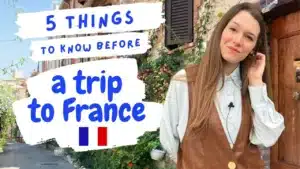Transcript
Instead, we'll say, "What do you like to eat?"
How are you doing? I'm doing fine...
In France, the people who still use the word "discothèque" tend to be grandparents.
Bonjour tout le monde! Welcome to another French lesson. Today, we're going to talk about words and expressions that you may have learned in your French lessons, but that native speakers don't use. Expressions, words that the French don't use in their everyday lives in France. Let's look at five of them together.
If you're new to this channel, I'm Elisabeth. Every week, I post videos to help you progress in French, to help you learn French that's really used and spoken, by the French.
Once again, this video is sponsored by Lingopie. If you haven't heard of Lingopie yet, you really must check out this streaming platform. It's like the Netflix of language learning. You choose a series, film or TV show that interests you and you can watch it with interactive subtitles.
When you click on a word you don't understand, you get a translation in your own language. Then all the words you click on are added to vocabulary lists, and the platform offers games to help you memorize them. You'll learn French in context, and that's the best part. It's the best way to memorize vocabulary and expressions over the long term.
What's more, I'm super excited because one of my favorite French series has just been added to the platform's catalog. You can find it under the name Desperate parents. In French, the series is called "fais pas ci, fais pas ça". It's a bit like a French "Modern Family".
The platform offers a seven-day free trial and is also offering 65 % off the annual subscription if you use the link in the description.
Let's go back to those vocabulary words or expressions that you may have learned in your French classes, but which are hardly used in France.
🚀 Transform your understanding of French IN 15 MINUTES A DAY
60 dialogues to boost your understanding of French 🇫🇷
If you say them, of course you'll be understood. Of course, these words exist, but they're not used much. The first word is discotheque. If you use this word, people will certainly immediately see that you're not French. In France, the people who continue to use the word discothèque tend to be grandparents. Today, the word that's really used on a daily basis is boîte or nightclub. We'll say "aller en boîte" and not "aller en discothèque".
The second word we hear a lot among foreigners, but which is a little out of date in everyday French language, is "petit-ami" for a boy and "petite-amie" for a girl. It's very, very rarely used. It's a very cute word. If you say it, everyone will understand. But it's true that in everyday language, we don't use this expression too much. We say "my boyfriend" or "my girlfriend". You're going to tell me that boyfriend and girlfriend can be confusing.
Indeed, because we also use copain and copine to talk about a friend. It's often clear from the context of the conversation that we're really talking about my boyfriend or girlfriend. In colloquial language, we also say mon mec and ma meuf. Here, it's slang, it's colloquial language, but it's used a lot when young people talk to each other. When you're a bit older, when you're over thirty, you say mon compagnon or ma compagne, or you can say mon conjoint and ma conjointe.
Third word, food, food. It's a word we use to talk about food in general, but we don't really use it much in everyday language. We're generally a little more specific in what we mean. I know that in English, the word "food" is used a lot, but in French, we're going to be a little more specific. For example, in French, we don't say "quelle nourriture aimes-tu?" Instead, we'll say "what do you like to eat?"
Let's turn the sentence around a bit. Again, food is said, but it's more a question of usage here that I'll explain. For example, if you go to a restaurant with Chinese food or Italian food, you're going to say c'est un restaurant de cuisine chinoise or c'est un restaurant de cuisine italienne. We'd rather use this formulation.
In French, the word food is used in many expressions, perhaps because it's shorter and simpler to say. For example, we'll say "fast food", we'll talk about "street food" and not fast food or street food, street food. In colloquial language, with family and friends, we use a word that's really a synonym for food, but we use it more often. It's chow.
You may have heard it in TV shows or movies. What's for dinner tonight? What's for dinner? It's a word we use a lot with family and friends.
The next expression is "comme ci comme ça". It's a really cute expression, but I think the only time I've ever heard it was in the mouths of strangers. If you say it, of course you'll be understood. Some French people use it, but it's not the norm. There are expressions to say the same thing that are used more often. This expression is not naturally used by a French person.
If I ask someone how they're doing, instead of answering like this or like that, they can simply say "I'm fine", but in a slightly neutral tone, a tone that shows it's neither great nor very bad. How's it going? Ça va... To say that you're doing moderately well, you can also use the colloquial expression "bof", which is heard much more often than comme ci comme ça, but has a slightly more negative ring. How's it going? Bof. Another expression also used is couci-couça. How's it going? Couci-couça. It's a perfect synonym for Comme ci, comme ça, but a little more widely used in France.
Let's move on to the fifth expression, the fifth formulation, which is "n'est-ce pas". Foreigners are often taught to end questions with n'est-ce pas. When do you end with n'est-ce pas? It's when you ask a question to which you think you know the answer. For example, I mean, "You're learning French, aren't you?" "It's cold, isn't it?" "You cook well, don't you?"
And yet, in everyday French usage, it's very, very rare to hear this expression. Instead, we use other little words that can be complicated for foreigners to understand. Instead, we'll say "il fait froid, non?" Or "It's cold, isn't it? "You cook well, don't you? You cook well, don't you? In reality, the French are much more likely to use these formulations than others, aren't they?
That's it for today. Let me know in the comments, if there are any other expressions you've learned in your French classes, but don't use much in real life.
See you soon, and don't forget to "like" the video if you liked it.








